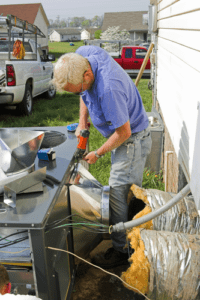Ah, the air conditioner: your best friend when the weather turns too hot to handle unassisted. However, owning an air conditioner is an important responsibility, and you must make sure that you take proper care of the system if you want it to perform in your home at ideal levels. Not only does that mean you will have to give the system regular care and maintenance during the many years you use it— but it also means that you will have to ensure that it has been installed correctly in the first place. One area you should pay careful attention to is your AC insulation. Insulation plays a vital role in maintaining the efficiency of your system, but many homeowners ignore it at great cost to themselves.
Why is AC Insulation Important?
 Insulation is critical to the proper operation of an air conditioner because its primary purpose is to prevent air from leaking. Think about it this way: when you’re spending money on cooling the air inside your home, don’t you want to make sure the air stays inside your home where you’ll actually feel it? It’s that simple. Insulation can also be valuable during the winter time when you want to make sure the heat your HVAC produces does not bleed into the outside air and leave your house chilly in cold weather.
Insulation is critical to the proper operation of an air conditioner because its primary purpose is to prevent air from leaking. Think about it this way: when you’re spending money on cooling the air inside your home, don’t you want to make sure the air stays inside your home where you’ll actually feel it? It’s that simple. Insulation can also be valuable during the winter time when you want to make sure the heat your HVAC produces does not bleed into the outside air and leave your house chilly in cold weather.
There are two major advantages that air conditioner owners can gain by paying attention to their AC insulation, and you should understand both so that you will be more likely to give your AC insulation the attention that it deserves.
-
- Insulation can improve the efficiency of your air conditioner, preventing leaks and effectively giving you more “bang for your buck” when it comes to the money you spend on cooling.
- A properly insulated home can allow you to cool the space efficiently with a smaller air conditioner than you would probably need otherwise.
The first point on that list is probably self-evident already, so let’s take a closer look at the second. How could insulating your home change the size of air conditioner you need to use in the space? Before we can answer that question, you’ll need to know something about the way air conditioners are sized (if you don’t already). Here’s the gist:
A Brief Guide to Sizing Air Conditioners
Not every air conditioner is right for every space. In fact, the air conditioner you use in your building should be a particular size if you want it to do its job properly. “Size” in this case refers less to the actual physical size of the unit, and more to the amount of cooling power it produces. The cooling power for a given air conditioner will be listed in Btu/hr., which stands for British thermal units per hour and refers to how much cooling the unit will be able to accomplish in a given period.
Generally speaking, the rule of thumb for sizing an air conditioner is this: the higher the Btu/hr., the larger the space it will be able to cool efficiently. Sounds simple, right? It’s not. Many different factors can affect the Btu/hr. needed for cooling a particular space. In addition to the size of the space, the following factors must be considered (among others):
-
- The number of windows
-
- The number of skylights
-
- The number of doors
-
- The floor and ceiling materials
-
- The local climate
- … and perhaps most importantly, the insulation used in your home
The Manual J load calculation is an equation that professional contractors use to determine the cooling requirements of each space in which they install a new system. It is a complicated piece of math that requires practice and training to perform accurately. As such, individual home- and business-owners are discouraged from attempting to perform a Manual J load calculation by themselves, or even with the help of websites and software that offers to complete it on their behalf. You will always receive better information from an experienced contractor who can visit your home and evaluate the space to be cooled.
Insulating your home effectively can prevent heat from leaking from the building, which allows an air conditioner with lower Btu/hr. to cool the space efficiently. As such, it can prevent homeowners from needing to purchase larger systems up front and will save them considerable amounts of money in the long run. Always make sure to check the AC insulation in your home before purchasing an HVAC, or call a professional who can undertake an assessment on your behalf. Investing in effective insulation at the front end will prevent you from unnecessary spending or poor performance during the lifespan of your cooling system.
Check with us here at Valley Comfort Heating and Air, our customers love our attention to detail and our friendly, affordable service. (707) 539-4533
